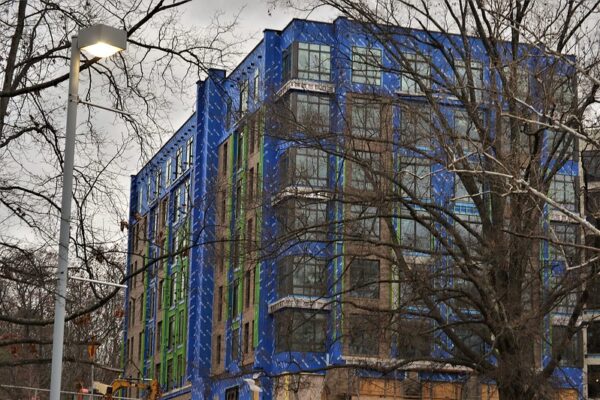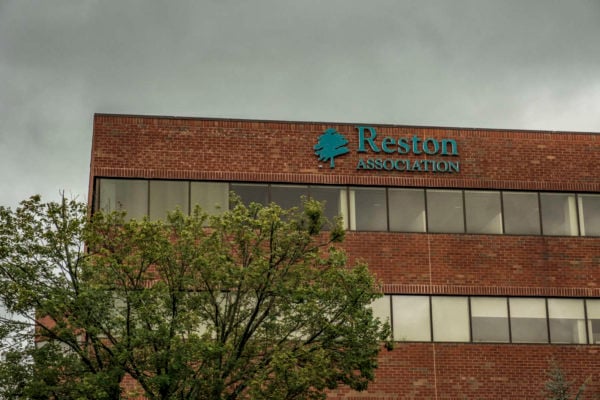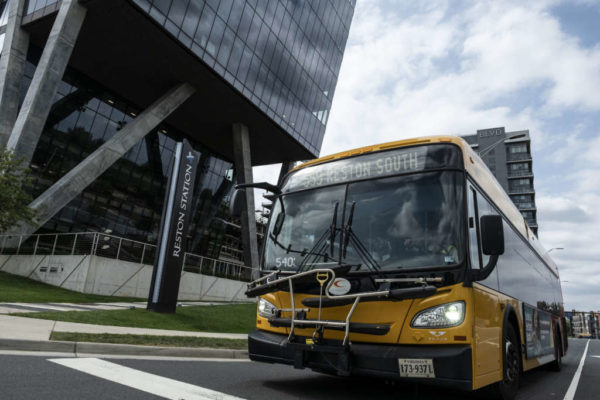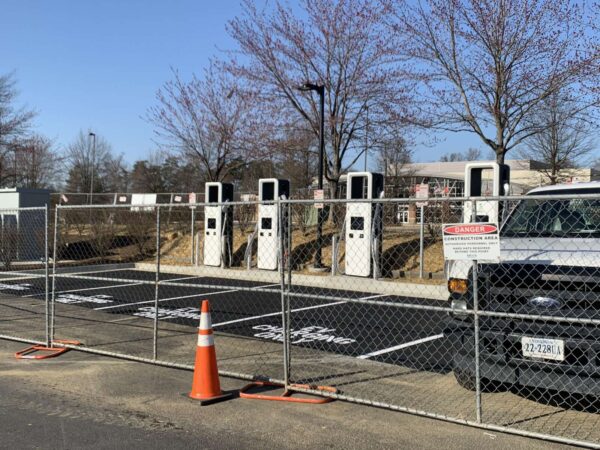Reston Speedskater Qualifies for Olympics — Short track speedster Maame Biney, a Reston resident, has earned a space on Team USA. She placed first in the 1,000-meter race and second in the 500 during U.S. Olympic Trials over the weekend. [Reston Patch]
Demand for Office Space Near Metro Up — The county is seeing an increase in demand for new office spaces near Metro stations, but older suburban properties appear to be falling behind. [Bisnow]
Metro to Buy Electric Buses — Metro will provide up to 10 new battery-powered buses as part of its transition to a zero-emission fleet. The Board of Directors has aimed to meet this goal by 2045. A Request for Proposals has been issued. [Metro]
School Security Officer Charged for Assaulting Student — A school resource officer has been charged with assaulting a student at Stone Middle School in Centreville. According to the Fairfax County Police Department, Lamar Hardy, 26, of Centreville, was arrested and charged with misdemeanor assault. [FCPD]
Photo via vantagehill/Flickr
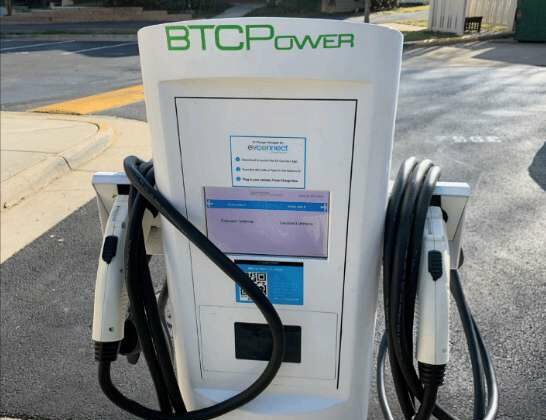
The Reston Association has adopted standards for what electric vehicle charging stations must look like when new ones are built outside residences and businesses.
The RA’s board of directors approved a document that creates restrictions and guidance for when the devices are installed.
The association already required property owners to have plans reviewed and approved by its Design Review Board. But the new standards create formal criteria.
“We are finally bringing this before the board,” said Cam Adams, the association’s director of covenants administration, before the unanimous vote yesterday in favor of the measure. The approval marks a 10-month process that began in January.
RA referred to the new standards as a guideline, but the approved document notes several restrictions in addition to preferences. According to the association, the document is acting as a blueprint for RA’s review of projects.
The measure restricts the use of bollards, stating no more than two can be used in front of a station, and says wheel stops are encouraged over bollards. It also adds that the use of the bollard at a station will be reviewed on a case-by-case basis.
It also restricts the use of wooden pedestals and limits the height of stations to 6.5 feet.
Among the guidelines, the document recommends that clusters, condos and apartments installing one in a common area have a parking plan to help “prevent sporadic installations on the common area.”
The standards also state that wall-mounted units will be reviewed on a case-by-case basis.
Interior charging stations, such as those in garages, are unaffected by the existing and new rules. And existing stations are grandfathered in, the association said previously.

As more and more drivers shift to sustainable vehicles, a design review board for the Reston Association is looking to formalize requirements for what electric vehicle charging stations must have outside homes and businesses.
Following a public hearing, the board agreed yesterday (Tuesday) to review process and design standards. Interior charging stations, such as those in garages, are immune from the existing and proposed rules.
“Reston Association will more than likely be one of the first associations to have a design guideline that is strictly related to electric vehicle charging stations; so we’re really happy about that,” said Cam Adams, the association’s director of covenants administration.
The proposed standards will eventually go before the RA Board of Directors for approval. A board operations committee could review the matter in October.
The association has previously noted that such charging stations already require design review board approval. But it has no formal criteria, which was part of the reasoning for creating the standards.
The new measure calls for restricting stations to 6.5 feet in height, limiting a station to have two bollards — those vertical posts used along interstate express lanes — with a same height restriction and prohibiting wooden pedestals as well as cables/cords from extending over paths, among other criteria.
It also calls for several preferences, such as using parking blocks over bollards.
About 7% of U.S. adults have an electric or a hybrid vehicle, an adoption rate that’s slower than China and Europe, according to the Pew Research Center.
The proposal says projects would require an applicant to obtain neighbors’ signatures. It also says a panel of the design review board would then review applications and apply the guidelines.
Existing stations that received design review board approval would be grandfather in, according to the association.
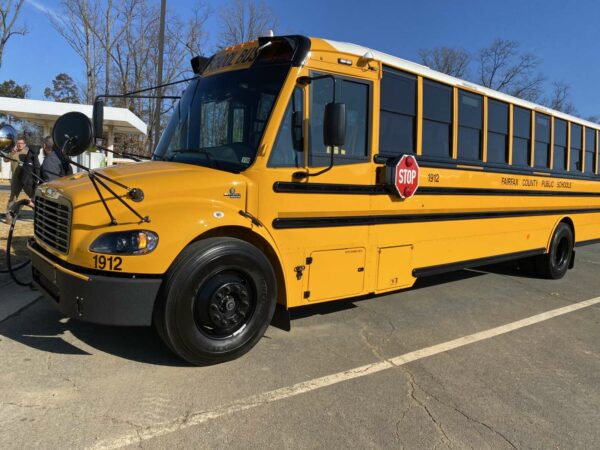
Fairfax County Public Schools will soon add another 10 electric school buses to its fleet, thanks to a new $2.65 million state grant.
19 school districts, including FCPS, will collectively receive more than $10 million in the latest round of allocations from Virginia’s Volkswagen Environmental Mitigation Trust — enough to replace 83 diesel school buses with electric and propane-fueled vehicles, Gov. Ralph Northam announced last Wednesday (Aug. 19).
“Virginia’s investments in electrifying the school bus fleets is an important and critical part of our comprehensive approach to reducing pollution,” Virginia Department of Environmental Quality Director David Paylor said in the news release. “Collectively, the replacement of these school buses is calculated to reduce carbon dioxide emissions by 10,000 tons per year, and will save one million gallons of diesel fuel, equivalent to removing 2,000 cars from the road.”
Administered by Department of Environmental Quality, the Volkswagen trust comes from Virginia’s $93.6 million share of the $2.7 billion settlement that the automobile manufacturer agreed to in 2016 after violating the Clean Air Act by cheating vehicle emissions tests.
Virginia announced the first round of funding from the trust on May 7, awarding over $9.4 million to help local governments purchase electric vehicles for their fleets. Fairfax County got more than $4 million for shuttle buses, waste and recycling trucks, and a truck for its public library system.
FCPS currently has eight electric buses that were placed in service this past May. The first bus arrived in January as part of a pilot program developed by Dominion Energy, which rolled out 50 buses across the state with plans to replace all diesel school buses with electric ones by 2030.
However, the future of Fairfax County’s transition to electric school buses has become a little hazier after the Virginia House of Delegates rejected an expansion of Dominion’s program that would’ve added 1,000 more electric school buses, a sign of legislators’ growing wariness of the utility company’s influence.
During its spring special session, the General Assembly voted to create an Electric Vehicle Grant Fund to help with the costs of adding electric school buses. Northam signed the bill into law, but the program has no funding yet.
Dominion confirmed that the newly awarded DEQ grants are unrelated to its program, which covered the difference in cost of an electric bus versus a diesel one as well as the cost and installation of charging stations.
“Children deserve clean transportation to school and we’re excited to see Virginia moving that way,” Dominion spokesperson Peggy Fox said. “The goal with our innovative program was to accelerate the adoption of electric school buses, so we’re thrilled to see more of these clean-running buses with zero emissions rolling out across Virginia.”
The utility says it is still offering to install charging stations for school districts for free in exchange for the ability to return stored energy back into the electric grid when the buses are idle and the chance to buy the bus batteries after the vehicles pass their life span.
“We will be involved if schools systems chose so,” Fox said in an email.
FCPS says its transportation department “continues to evaluate” its existing electric buses and work with vendor Thomas Built Buses to make adjustments.
While shifting to electric buses is expected to reduce operational and maintenance costs in the long run, the district’s transition is currently limited by the availability of funding and charging infrastructure, which affects where the buses can be assigned.
“As more funding opportunities become available, as the technology is refined for school division needs, and as charging infrastructure becomes readily available, FCPS plans to transition its fleet of 1,625 buses to electric,” FCPS spokesperson Julie Moult said by email.
The 10 new buses funded by the DEQ grant are scheduled to arrive in March 2022.
“Operation and maintenance of the electric buses are being monitored and evaluated for efficiency of operation and cost savings,” Moult said.
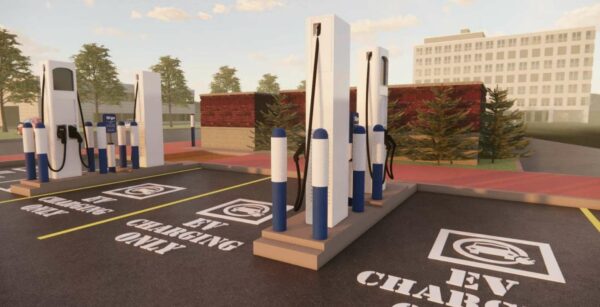
The Town of Herndon could soon get a couple more electric vehicle (EV) charging stations.
Herndon’s Architectural Review Board is scheduled to hold a public hearing at 7:30 p.m. today (Wednesday) to discuss the potential installation of four EV charging stations at Herndon Marketplace on 413 Elden Street.
Identified as Stephan Osborne, the applicant has proposed putting the new charging stations in the parking lot of the Safeway that anchors the shopping center, according to a staff report.
The proposed installation includes two masonry enclosures to screen necessary equipment that support the stations. The site will be accessible from Elden Street, Post Drive, and Grove Street.
The proposed stations will include blue and white bollards as barriers from vehicles, and the enclosure will be a block and brick wall with an opaque metal gate.
The landscape perimeter around the parking lot of the shopping center would also serve as an additional visual buffer between the proposed installation and the street.
Town staff say their report that the installation “should not have a major visual impact on the site.” The materials and design of the stations would match the current design of the shopping center. No lighting has thus far been specified for the stations.
Town staff has deemed the proposal compatible with “the applicable standards and requirements” of the town, including design criteria, according to the staff report.
The Architectural Review Board will also hold public hearings tonight on a sign plan and renovations at the Spring Park Technology Center, newly named Marker 20.

The Reston Association Design Review Board is set to vote on guidelines for electric vehicle charging stations today (Aug. 16).
Draft guidance setting parameters including about location, size, and appearance of the stations will be discussed and reviewed during the board’s meeting, which starts at 7 p.m. The board is also expected to decide whether to send the draft to the RA Board Operations Committee for feedback, RA spokesperson Mike Leone confirms.
Electric vehicle charging stations have been much discussed at cluster and RA meetings in recent months.
More and more electric vehicle charging stations have been installed throughout clusters and Reston over the last year, according to a January presentation.
Although they were all approved by the DRB, they have emerged without established guidance or standards and without consistent consultation with RA. As a result, the charging stations often vary in appearance and sometimes even pose safety risks due to their locations.
In all, six different types and designs of stations have been approved by the DRB.
Earlier in the year, RA contracted engineering consultant Kimley Horn to help establish guidelines. In May, staff admitted that, upon further research, providing adequate guidance was “more complex” than initially thought.
While a preliminary draft of guidelines has been out for several months, a working group has met twice to discuss amendments and changes.
The updated draft addresses concerns from RA members and staff. It limits charging stations to six-and-a-half feet in height, and they may not have any cords or cables that extend into foot traffic paths. They must appear “seamlessly” integrated into the surroundings, among other parameters.
Applications will also require photos or drawings of the proposed stations, proof of a maintenance agreement, and a “qualified, experienced” person to install the station.
It’s expected that a draft of the guidelines will be submitted to the BOC for feedback in time for their Sept. 7 meeting. Then, the design review board will hold a public hearing later that month.
It is estimated that the RA Board of Directors will approve the guidelines at their October 28 meeting and a set date for implementation.
RA has also been exploring the possibility of replacing its fleet of fossil-fuel vehicles with electric ones over the next decade. That initiative, though, has met some obstacles, as a staff report found that a full fleet replacement remains prohibitive due to the cost and availability of electric vehicles.
RA’s Chief Operation Officer Larry Butler said at a meeting in June that Kimley Horn, which is also assisting RA in this matter, recommended reevaluating electric vehicle options “every two to three, maybe four, years.”
Photo via Reston Association

Virginia is reconsidering the future of funding for transportation infrastructure, as the rise of electric and more fuel-efficient vehicles has cut into the gas tax revenue that helps pay for those projects.
One option the Commonwealth has started pursuing is a “mileage-based user fee” that drivers would pay depending on how much or little they travel. Drivers could opt into the voluntary system in lieu of paying a mandatory highway user fee that first took effect on July 1, 2020.
State Sen. Janet Howell (D-32nd District) says the highway use fee — which applies to cars that average at least 25 miles per gallon and is calculated based on the fuels tax at the time of a vehicle’s registration and the average number of miles it travels in the state — is a precursor to Virginia’s planned mileage-based user fee program.
“For most of the past decade, Virginia, like the rest of the country, has been wrestling with the challenge of identifying the best approach to generating sufficient revenues to support transportation investments,” she said in a statement. “As cars have become more fuel efficient and electric vehicle adoption increases, it is increasingly difficult to strike the right balance of raising adequate revenues from traditional sources and adhering to a usage-based philosophy of highway financing.”
The Virginia Department of Motor Vehicles is currently fielding requests from private contractors to operate the program, which it anticipates rolling out in July 2022. Led by the DMV, a workgroup tasked with developing the program is slated to deliver an interim report to the Commonwealth this December.
The working group is identifying all requirements to Virginia’s mileage-based user fee program with “a priority on consumer privacy protection and equity,” DMV spokesperson Jessica Cowardin said in a statement.
Seeking new ways to fund road repairs and transit projects, Virginia established the mileage-based fee program in April 2020 when the General Assembly adopted a major transportation bill that also established the highway use fee and raised gas taxes for the first time in more than three decades.
The bill also lowered vehicle registration fees by $10 and repealed an annual $64 fee for electric and alternative fuel vehicles.
The changes, which include tying the gas tax rate to the Consumer Price Index to keep up with inflation starting next year, will help Virginia diversify its funding sources to offset stagnant or declining gas tax revenue, state legislators say.
The consultant KPMG previously estimated that Virginia would lose nearly 33% of its gas tax revenues by 2030 due to fuel efficiency, or approximately $260 million.
“Neither the [Highway Use Fee] nor the EV Registration fee are intended to suppress the sales of fuel efficient or electric vehicles, but simply recapture the average annual revenue from the foregone gas taxes,” Howell said.
The idea of taxing drivers based on how much they travel instead of the fuel they use has been gaining traction throughout the U.S. over the past decade.
Despite inflation, the federal gas tax rate has been locked in at 18.4 cents per gallon since it went up from 14.1 cents in 1993, meaning there’s less money to fund highway improvements.
“Many cars are not using gas at all, such as electric, so that system of highway finance has been coming apart for a long time,” said Jonathan Gifford, director of George Mason University’s Center for Transportation Public-Private Partnership Policy in Arlington.
If Virginia wants to encourage a transition to clean energy and electric vehicles, which “is absolutely essential to addressing climate change, we will need to look to other options” to pay for transportation projects, Northern Virginia Transportation Alliance President Jason Stanford says. Read More
Reston Association is looking at potentially introducing greater electric vehicle initiatives, but a months-long evaluation of the proposal’s feasibility has revealed some hurdles.
During the RA Board of Directors meeting on May 27, COO Larry Butler and Cam Adams, the director of covenants administration, presented findings from a study of electric vehicles and charging stations that the board unanimously approved on Feb. 25.
One of the motions approved in February directed RA staff to study the possibility of installing electric vehicle charging stations at one or more RA facilities. The other motion called for staff to review the potential replacement of the association’s current fleet of fossil-fueled vehicles over the next 10 years.
With notes from consulting firm Kimley-Horn, Butler said at last week’s meeting that the availability of electric vehicles does not meet the general needs necessary for the complete conversion of the fleet at this time.
Since the majority of RA’s fleet consists of trucks, the current design for electric trucks does not meet the association’s needs, according to Butler, who noted that they typically have shorter beds than fossil-fuel versions and lack power capabilities for towing, hauling, or snow plowing.
However, he clarified that “this is really just the beginning of this investigation,” and the review to switch to electric vehicles will continue.
“The market isn’t there yet. It’s moving very fast,” Butler said.
He told the board that Kimley-Horn had recommended reevaluating electric vehicle options “every two to three, maybe four, years.”
“As the market becomes more robust with the types of vehicles, the cost of those because the competition will also come down…we’ll be in a better place to really look at more wholesale conversion,” he said.
There will remain consideration in the budget for electric vehicles, but a full conversion is not yet possible, in Butler’s opinion.
“We are in the early stages of going from fossil to electric. You’ve raised, I think, what are the major issues,” RA Director Bob Petrine said after Butler’s presentation. “I think the biggest single one is there isn’t at the moment a good break-even point. The trucks that are in offing are more toys than they are work trucks.”
Adams followed this discussion by addressing the board’s Jan. 28 directive to study how RA, the Design Review Board, and the covenants committee can assist clusters considering the installation of EV charging stations.
He suggested that a draft guideline could be presented to the DRB when it meets in July but estimated a final draft will take about five months to prepare, potentially for presentation in October.
While the Design Review Board has already approved six separate types of EV installations, it does not have an established guideline “that the DRB can objectively review that application,” according to Adams.
He added that the board would probably review any request submitted for an EV installations and that each “will evaluate it in a certain level of reasonableness that’s appropriate.”
Fairfax County is taking a small but crucial first step toward electrifying its sprawling government vehicle fleet, thanks to more than $4 million in state grants.
Gov. Ralph Northam announced on Friday (May 7) that the county will receive $4.4 million from the first round of Virginia’s Clean Air Communities Program, an initiative that launched in November using $20 million from the state’s Volkswagen Environmental Mitigation Trust.
Three of the five awarded grants went to Fairfax County agencies:
- Department of Transportation: $2.9 million for four shuttle buses and chargers
- Department of Public Works and Environmental Services: $1.2 million for four solid waste and recycling trucks and chargers
- Department of Vehicle Services/Department of Procurement and Material Management: $205,275 to purchase a medium-duty truck and charger for the public library system
The other recipients are the Metropolitan Washington Airports Authority, which will get $3.9 million to purchase five shuttle buses and chargers, and Amherst County, which got $998,301 for two trucks, a shuttle bus, and chargers.
“Supporting clean transportation solutions is a vital part of our efforts to combat climate change and improve air quality in the Commonwealth,” Northam said. “These investments will reduce harmful vehicle pollution, which disproportionately impacts marginalized communities, and help accelerate an equitable transition to a cleaner economy for all Virginians.”
Fairfax County will use its grant funds to launch an electric vehicle pilot as part of a broader push to eliminate fossil fuels from the county’s transportation operations and achieve carbon neutrality by 2040.
The county’s Joint Environmental Task Force recommended in October that the Fairfax Connector bus fleet transition to electric vehicles or other non-carbon-emitting alternatives by 2030, followed by public school buses and non-bus vehicles in 2035.
The county has approximately 6,347 vehicles in its overall fleet, including 1,540 Fairfax County Public School buses, according to the Department of Vehicle Services.
While the new pilot will kick off the conversion of the county government fleet, FCPS received its first electric school buses in January from a statewide initiative led by Dominion Energy, which has pledged to replace all diesel buses in the state with electric ones by 2030.
The county first utilized electric vehicles for public transit in November, when the autonomous Relay shuttle kicked off passenger service in Merrifield for a year-long pilot project.
“To cut carbon admissions, we have to reimagine the way in which we travel,” Fairfax County Board of Supervisors Chairman Jeff McKay said. “As a county, we are already actively moving towards cutting our emissions from our public transit and this will move us closer to our end goal.” Read More
New electric vehicle charging stations are coming to Target in Reston this summer.
While the stations have been installed, they won’t go live until the summer. Four 150 kilowatt-hour chargers are planned at Target, which is located at 12197 Sunset Hills Road.
The stations are powered by Electrify America, a Reston-based company that promotes zero-emission vehicle adoption through an a fast and convenient charging network across the country.
The company, which was founded in 2016, currently does not have plans for additional stations in Reston and Herndon, a company spokesperson told Reston Now. But other locations are planned in Northern Virginia.
So far, the company has built more than 570 charging stations with around 2,500 individual chargers. Last year, Electrify America also completed two cross-country routes.
Roughly 800 total stations with about 3,500 chargers that are specifically designed for quick charging are planned by the end of this year.
The expansion at Target is part of a nationwide push to expand electric vehicle charging option. In 2018, Target announced that it plans to add the stations to 600 parking spaces at more than 100 sites across more than 20 states.
“Accelerating our efforts to install new charging stations at Target stores across the country is one way we’re building on our commitment to investing in solutions that leave our communities better for future families,” said John Leisen, vice president of property management at Target.
Photo via Matt Bianco


